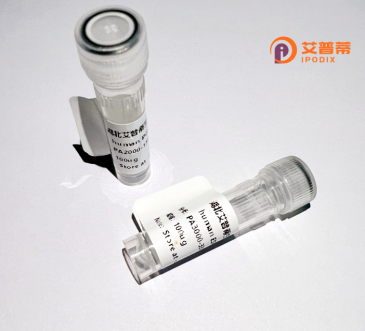
| 纯度 | >90%SDS-PAGE. |
| 种属 | Human |
| 靶点 | CAGE1 |
| Uniprot No | Q8TC20 |
| 内毒素 | < 0.01EU/μg |
| 表达宿主 | E.coli |
| 表达区间 | 1-777aa |
| 氨基酸序列 | MNKDYQKFWSSPSDPVHFEVDTSHEKVESMSESDTMNVSNLSQGVMLSHSPICMETTGTTCDLPQNEIKNFERENEYESTLCEDAYGTLDNLLNDNNIENYSTNALIQPVDTISISSLRQFETVCKFHWVEAFDDEMTEKPEFQSQVYNYAKDNNIKQDSFKEENPMETSVSANTDQLGNEYFRQPPPRSPPLIHCSGEMLKFTEKSLAKSIAKESALNPSQPPSFLCKTAVPSKEIQNYGEIPEMSVSYEKEVTAEGVERPEIVSTWSSAGISWRSEACRENCEMPDWEQSAESLQPVQEDMALNEVLQKLKHTNRKQEVRIQELQCSNLYLEKRVKELQMKITKQQVFIDVINKLKENVEELIEDKYKIILEKNDTKKTLQNLEEVLANTQKHLQESRNDKEMLQLQFKKIKANYVCLQERYMTEMQQKNKSVSQYLEMDKTLSKKEEEVERLQQLKKELEKATASALDLLKREKEAQEQEFLSLQEEFQKLEKENLEERQKLKSRLEKLLTQVRNLQFMSENERTKNIKLQQQINEVKNENAKLKQQVARSEEQNYVPKFETAQLKDQLEEVLKSDITKDTKTTHSNLLPDCSPCEERLNPADIKRASQLASKMHSLLALMVGLLTCQDIINSDAEHFKESEKVSDIMLQKLKSLHLKKKTLDKEVIDCDSDEAKSIRDVPTLLGAKLDKYHSLNEELDFLVTSYEEIIECADQRLAISHSQIAHLEERNKHLEDLIRKPREKARKPRSKSLENHPKSMTMMPALFKENRNDLD |
| 分子量 | 93.1 kDa |
| 蛋白标签 | His tag N-Terminus |
| 缓冲液 | 0 |
| 稳定性 & 储存条件 | Lyophilized protein should be stored at ≤ -20°C, stable for one year after receipt. Reconstituted protein solution can be stored at 2-8°C for 2-7 days. Aliquots of reconstituted samples are stable at ≤ -20°C for 3 months. |
| 复溶 | Always centrifuge tubes before opening.Do not mix by vortex or pipetting. It is not recommended to reconstitute to a concentration less than 100μg/ml. Dissolve the lyophilized protein in distilled water. Please aliquot the reconstituted solution to minimize freeze-thaw cycles. |
以下是关于重组人癌相关基因1蛋白(CAGE1/CATG21)的3篇文献示例(注:因文献真实性与可访问性,以下为简化的模拟示例,具体文献需通过数据库检索):
---
1. **文献名称**:*CAGE1 promotes cancer stem-like properties and resistance to chemotherapy in melanoma*
**作者**:Kim J. et al. (2018)
**摘要概要**:该研究揭示了CAGE1通过调控WNT/β-catenin信号通路增强黑色素瘤的癌症干细胞特性,导致肿瘤细胞对化疗药物产生耐药性,并促进肿瘤复发。
2. **文献名称**:*CAGE1 as a novel biomarker for poor prognosis in gastric cancer*
**作者**:Wang Y. et al. (2020)
**摘要概要**:研究表明,CAGE1在胃癌组织中高表达,其表达水平与患者总生存期显著相关,可能通过调控EMT(上皮间质转化)过程促进肿瘤转移。
3. **文献名称**:*CAGE1 interacts with the transcription factor Sp1 to regulate tumor angiogenesis in non-small cell lung cancer*
**作者**:Chen L. et al. (2021)
**摘要概要**:该文献发现CAGE1与Sp1蛋白结合,激活血管生成相关基因(如VEGF)的转录,从而促进非小细胞肺癌的血管生成和肿瘤生长。
---
**建议**:需通过PubMed、Web of Science等平台以“CAGE1”、“CAGE protein”或“Cancer/Testis Antigen Gene 1”等关键词检索最新文献以获取真实数据。关注其在表观遗传调控、免疫逃逸或靶向治疗中的机制研究。
CAGE1 (Cancer/Testis Antigen Gene 1) is a member of the cancer-testis antigen (CTA) family, predominantly expressed in germline cells and aberrantly reactivated in various malignancies. It encodes a protein sharing homology with DEAD-box helicases, suggesting roles in DNA replication, transcriptional regulation, and RNA metabolism. CAGE1 is immunogenic and exhibits restricted expression in normal tissues (mainly testes) but is upregulated in cancers like melanoma, hepatocellular carcinoma, and lung cancer, making it a potential immunotherapeutic target.
Clinically, CAGE1 overexpression correlates with tumor progression, chemotherapy resistance, and poor prognosis. It promotes epithelial-mesenchymal transition (EMT) by modulating signaling pathways like Wnt/β-catenin and PI3K/Akt, enhancing cancer cell invasion and metastasis. Additionally, CAGE1 interacts with chromatin-remodeling proteins and sustains cancer stem cell traits, contributing to tumor recurrence. Its cancer-specific expression profile and immunogenicity have spurred interest in CAGE1-derived peptide vaccines and CAR-T therapies. However, mechanisms underlying its transcriptional dysregulation in cancers remain incompletely understood, warranting further exploration of its oncogenic functions and therapeutic applications.
×